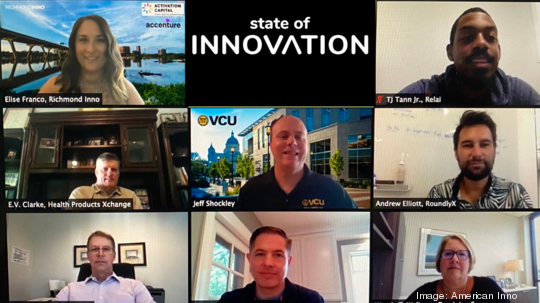
The impact of Covid-19 over the last year forever changed how people and businesses access every day products and services, and solving supply chain issues has come to the forefront for companies of all sizes.
During Richmond Inno's latest virtual event last week, a panel of local supply chain experts discussed the trends, innovations and best practices around building and maintaining sustainable and efficient supply chains.
The event kicked off with pitches from three local startup founders, RoundlyX co-founder and Chief Executive Officer Andrew Elliott, Relai co-founder and Chief Operating Officer TJ Tann Jr., and Warehowz founder and CEO Darrell Jarvey.
Following the pitches, event moderator Jeff Shockley, Virginia Commonwealth University associate professor of supply chain management and analytics, spoke with panelists Wendy Wellener, vice president of shared services at Dominion Energy Services; Russell Moore, strategy and consulting managing director at Accenture; and E.V. Clarke, CEO at Health Products Xchange and HPX Connect.
Below are a few key takeaways from the conversation. If you missed the live event, keep scrolling to watch the recording.
What did this past 18 months reveal about your supply chain, and what’s different about it today than at the beginning of 2020?
E.V. Clarke, Health Products Xchange: You're seeing this entire bullwhip effect play itself out where you simultaneously had surplus in some places, and at the same time, you had major shortages and people couldn't find products. Our model is designed to create a marketplace that connects and maximizes access and visibility to sources. More than anything, (Covid-19) validated our model. I will tell you that when we were prototyping this and going out and talking to providers, we were having to explain our value composition. We don't have to do that anymore.
Russell Moore, Accenture: Early Covid, a lot of our clients experienced figuring out how to get PPE to their folks who are necessary for operations. One of the interesting things we did at Accenture was, we partnered with Microsoft to create really kind of a Match.com between companies that had the ability to create PPE and companies that were in need. We saw a quick and agile adjustment in the marketplace to be able to match those supply and demand factors.
Are any of the changes “pandemic only,” meaning that you have reverted back to how you did things pre-Covid? What’s sticking around?
Wendy Wellener, Dominion Energy Services: We learned a lot about the value of teamwork and collaboration, relationships with supplies and integration with the business segment operations teams that we support on a day-to-day basis. I think the biggest takeaway we had was we learned the value of that ability to work virtually and the technology that's available to enable that. (Pre-pandemic) I didn't know how to use WebX or Microsoft Teams. We just didn't utilize those services because we didn't need to. The pandemic really forced us to learn how to use technology and provided insight into the fact that remote work does work for some, and it's very effective.
Moore: What we're seeing across our client base and a lot of the conversations are around return to work, and the supply chain implication of that is really around your contracting, around lease management and building management. Accenture itself is looking to reduce our footprint by about 25% because our folks have proven they can work remotely and be very productive in doing so.
Clarke: In our case, it's kind of interesting because when you think about ore-Covid, the entire business model was wrapped around reduction of inventory. We thought that supported our value proposition because it limited supplies and when there were shortages we'd have a greater model. Covid flipped everything. Every hospital system in the country now has a warehouse ... It's sort of twisted our value proposition a little bit to determine what kind of role we play in helping alleviate turning inventory in a way we didn't really anticipate.
As you’re managing and iterating your supply chain, how do you ensure it’s as environmentally and socially responsible as possible?
Wellener: We do have a very strong focus on sustainability and environmental protection here at Dominion Energy. We do have a goal to reach net zero emissions by 2050 and to be the most sustainable energy company in the country, and that's quite a large feat for us. So, it's something we focus on in every aspect of our operations.
Clarke: One thing we didn't plan on that got exposed with Covid is that the veil got pulled off as to where the product is actually made. Hospitals did not know that. They knew the brands they bought, but they did not know where they were made, and now, suddenly, they're asking all the right questions about "What are the conditions?" and "How is this being made?" Those types of things, I think are a requirement for our industry's future; it's a good thing to come out of this.